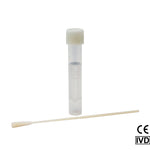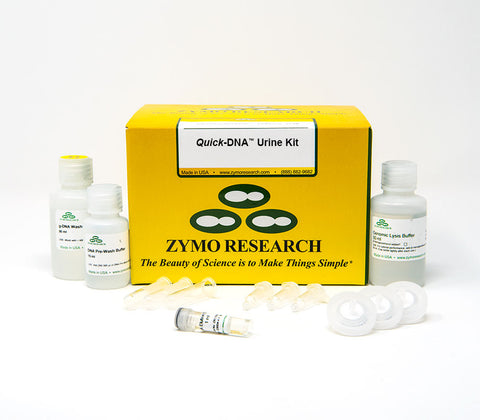Successfully Added to Cart
Customers also bought...
-
 DNA/RNA Shield (50 ml)Cat#: R1100-50DNA/RNA Shield reagent is a DNA and RNA stabilization solution for nucleic acids in any biological sample. This DNA and RNA stabilization solution preserves the...
DNA/RNA Shield (50 ml)Cat#: R1100-50DNA/RNA Shield reagent is a DNA and RNA stabilization solution for nucleic acids in any biological sample. This DNA and RNA stabilization solution preserves the... -
 DNA/RNA Shield SafeCollect Swab Collection Kit, 1ml (1 collection kit)Cat#: R1160The DNA/RNA Shield SafeCollect Swab Collection Kit is a user-friendly collection kit for stabilizing the nucleic acid content of samples collected with a swab. DNA/RNA Shield completely inactivates harmful pathogens...
DNA/RNA Shield SafeCollect Swab Collection Kit, 1ml (1 collection kit)Cat#: R1160The DNA/RNA Shield SafeCollect Swab Collection Kit is a user-friendly collection kit for stabilizing the nucleic acid content of samples collected with a swab. DNA/RNA Shield completely inactivates harmful pathogens...
Quick-DNA Urine Kit
| Cat # | Name | Size | Price | Quantity |
|---|
Highlights
- Purify cellular and/or cell-free DNA easily and reliably from up to 40 ml of urine.
- Uniquely formulated urine conditioning reagent allows stabilization of DNA in urine for up to 1 month at ambient temperature.
- Zymo-Spin column technology ensures DNA is ready for all sensitive downstream applications including qPCR, DNA sequencing, arrays, and DNA methylation analysis.
Documents
Product Description
Technical Specifications
| Applicable For | All sensitive downstream applications such as qPCR and Next-Generation sequencing. |
|---|---|
| Equipment | Centrifuge, microcentrifuge, and heat block/bath. |
| Processing Volume | ≤ 40 ml |
| Purity | Typical A260/A280 ≥ 1.8 |
| Sample Source | Urine |
| Sample Storage | Eluted DNA should be stored at ≤ -20°C. |
| Size Range | 100 bp - 23 kb |
| Type | Total DNA including cfDNA |
| Yield | Up to 5 µg total DNA can be eluted into ≥ 10 µl. 6 - 1000 ng/ml for healthy females. 2 - 20 ng/ml for healthy males. |
Resources
Q1: If I plan to process my urine samples immediately, is the Urine Conditioning Buffer necessary?
The Urine Conditioning Buffer (UCB) is necessary if you are interested in isolating cell-free DNA. If omitting the UCB, only cellular DNA is recovered.
Q2: What is the function of the Clearing Beads?
When the Urine Conditioning Buffer is added to the urine, the Clearing Beads helps to create a compact pellet and make it the pellet easy to visualize during the procedure.
Q3: Can I process urine samples stabilized in DNA/RNA Shield?
Yes, however, the volume of sample processed becomes large and difficult to handle. In addition, cellular and cell-free DNA cannot be separated. To process urine samples stabilized in DNA/RNA Shield, please contact technical support at tech@zymoresearch.com.
Q4: What should I do if I see an oil layer on top of the pellet, after centrifugation?
Remove the oil layer by pipetting and process the pellet. However, residual oil will not affect purification.
Q5: Can cell-free DNA be isolated from urine stored at – 80 °C?
We recommend stabilizing fresh urine with the Urine Conditioning Buffer and storing stabilized urine for later processing. Frozen urine can be processed, however, cells may lyse open upon freeze-thaw, causing in fragmentation of gDNA and resulting in more cell-free DNA than what was originally present.
Q6: Is the Quick-DNA Urine kit compatible with DNA Urine Preserve from Streck?
Yes, however, we cannot guarantee the efficiency of the Streck preservative.
| Cat # | Name | Size | Price | |
|---|---|---|---|---|
| D3004-1-50 | Genomic Lysis Buffer | 50 ml | €40,50 | |
| D3061-1-140 | Urine Conditioning Buffer | 140 ml | €149,00 | |
| D3004-4-4 | DNA Elution Buffer | 4 ml | €11,90 | |
| D3061-2-1 | Clearing Beads | 1 ml | €64,20 | |
| D3061-3-20 | Urine Pellet Digestion Buffer | 20 ml | €49,90 | |
| D3061-4-10 | Urine DNA Prep Buffer | 10 ml | €25,00 | |
| C1001-50 | Collection Tubes | 50 Pack | €17,90 | |
| C1015-50 | Zymo-Spin IC-S Columns | 50 Pack | €61,80 | |
| D3061-5-12 | Urine DNA Wash Buffer | 12 ml | €40,50 | |
"Good yields of DNA in a very simple efficient process."
R. W.
Medical University of South Carolina
"The kit is very useful as it lets us to analyze big volumes without an ultracentrifugation step."
S. B.M.
University of Barcelona
"The protocol was easy to use/follow and it didn't take a great deal of time to get results."
S. H.
South College School of Pharmacy
Need help? Contact Us


